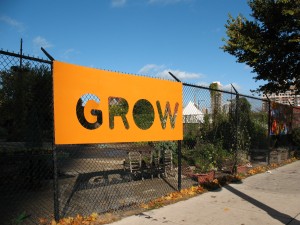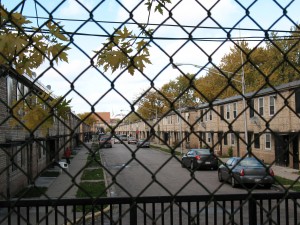This coming spring semester I will be offering the inaugural section of SUST 350 Service and Sustainability at the Chicago Campus. The specific course theme is Urban Farming, Community Development, and Social Justice.
- Title/number: SUST 350 Service and Sustainability (section L10)
- Semester offered: Spring 2012 (initial offering)
- Campus: Chicago
- Day/time: Wed 3-5:30pm
- Pre-req: UWR
- Text: Lorraine Johnson, City Farmer: Adventures in Urban Food Growing (Greystone, 2010, paper, ISBN 9781554655190) — on order at the RU bookstore
SUST majors and minors may take this class to fulfill an upper-level SUST requirement, but 350 also is open to students at large who need a general education course or desire elective credit.
Introduction to the Course
SUST 350 focuses on one of sustainability’s “Three Es” — social Equity — within the broad context of Environmental stewardship and Economic development. Students will learn about one of the most important components of sustainability — food production and consumption — in the context of urban neighborhoods and ecosystems.

By doing hands-in-the-dirt labor at Chicago Lights Urban Farm on the city’s near-North Side, students will gain direct knowledge of contemporary organic/urban agricultural systems as well as learn about pressing urban social justice issues such as food deserts, gentrification, pollution, environmental racism, and persistent poverty. Initial class meetings through February will be at RU’s Chicago Campus, while subsequent class meetings will take place at the farm.
Once established at the farm site in mid-March, Roosevelt students will work side-by-side with Cabrini-Green neighborhood youth in a unique reciprocal learning opportunity. Participants in the Chicago Lights Youth Corps program (14-21 age range) work as job trainees at the farm 9 hours/week during the school year and 20 hours/week during the summer.

They acquire skills in urban agricultural production (composting, soil management, seedbed planning, hydroponics, organic pest management, harvesting, etc.) and economy (packaging, marketing, distribution, and sales). To the extent that Roosevelt students are newcomers to these activities, they will be learning skills from the Youth Corps kids as well as from the urban farming experts.
An urban farm is about food, but so much more besides. The Cabrini-Green community is an economically stressed neighborhood that has gone through dramatic and wrenching changes as high-rise public housing has been demolished, residents have been displaced within and without the community, and gentrification proceeds at a rapid pace — even as crime and poverty persist. Here, an urban farm is a source of freshly grown, organic produce; a training ground for local youth in need of practical job skills; a stop valve in the Cradle-to-Prison pipeline; a gathering place for people of all ages in the community for physical exercise, informal education, and social events (such as the annual Fall Harvest Festival held on-site); a demonstration site for sustainable agricultural techniques; a model of economic development on a local, sustainable scale; and a means of reconnecting urban folk to the natural world. More generally, in urban areas starved for jobs, green space, safe outdoor gathering places, and fresh quality food, these small-scale farms productively and powerfully address the need for social equity and progressive change.
Partner Organizations: Chicago Lights Urban Farm and Growing Power
The Chicago Lights Urban Farm is one wing of the Chicago Lights Community Outreach Organization on Chicago’s near-North Side, and is located at 444 W. Chicago Avenue, the south end of the Cabrini-Green neighborhood.

Formerly known as the Chicago Avenue Community Garden, it began in 2003 as a modest collection of raised-bed planters covering the cracked blacktop of an abandoned basketball playground. Since then, the farm has expanded and diversified its operations with the help of Growing Power, a nationally-recognized urban farm initiative based in Milwaukee that has established satellite operations in several Chicago neighborhoods (including Cabrini-Green, Altgeld Gardens, Grant Park South, and Bridgeport). The mission of the farm is to “empower . . . youth and community residents in the Cabrini-Green neighborhood to have increased economic opportunities through access to organic produce, nutritional education, and work force training” (Chicago Lights “Urban Farm”).
Field Trips in Urban Ecology
SUST 350 Service and Sustainability provides an ideal context for field-based learning experiences that connect progressive social/environmental action to sustainable community development. While the Chicago Lights Urban Farm itself is a quintessential example of such a field experience, a selection of well-planned day trips to other sites will broaden that learning experience for RU students as well as provide a rare opportunity for the farm’s Youth Corps participants to leave the confines of their home neighborhood, see other parts of the region they have little to no familiarity with, deepen their understanding of urban ecology, and personally connect with the varied and surprisingly engaging forms of the region’s urban nature. In this expression of reciprocal learning, RU undergrads and Youth Corps students will be learning together in the context of adventurous new experiences, a process necessitating team-work and producing a profound sense of personal accomplishment.
Planned field trips tentatively include a tour of urban farms sites in Chicago, the Growing Power flagship farm in Milwaukee, the South Branch of the Chicago River, and/or the Indiana Dunes. See this page for accounts of recent student field trips in my SUST courses.
8 thoughts on “SUST 350 Course Preview for Spring 2012”
Comments are closed.